 klaus-michael schneider
klaus-michael schneider
Keywords: education |
Links: FOTW homepage | search | disclaimer and copyright | write us | mirrors

Last modified: 2021-08-26 by  klaus-michael schneider
klaus-michael schneider
Keywords: education |
Links: FOTW homepage |
search |
disclaimer and copyright |
write us |
mirrors
See also:
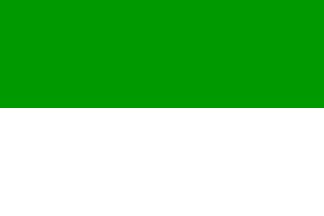 image by Ivan Sache, 11 November 2010
image by Ivan Sache, 11 November 2010
Colegio Santa Ana, located in Fontibón (Bogotá Capital District), was founded
in 1948 by Ligia Mendoza de Méndez.
The flag of Colegio Santa Ana, as shown graphically on the institute's website,
is horizontally divided green-white. Green means hope, vision of triumph and
continuity in duty. White represents ethical and moral honesty.
Source:
http://colegiosantaana.edu.co/WebSite/simbolos.jsp
Ivan Sache, 11 November 2010
 image by Ivan Sache, 15 November 2010
image by Ivan Sache, 15 November 2010
Colegio Santa Ana de Flores is located in Simacota, Department of Santander.
The flag of Colegio Santa Ana de Flores, as shown graphically on the institute's
blog, is divided white-green by the ascending diagonal. White represents peace
and tranquility. Green represents the natural resources and hope in a better
future.
http://cesanpedro.wordpress.com/
Ivan Sache, 15 November 2010
 image by Ivan Sache, 1 January 2021
image by Ivan Sache, 1 January 2021
Gimnasio Integral Santa Ana (GINSA) is located in Envigado (Antioquia).
The flag of GINSA is horizontally divided blue-pink, modeled on the
student's uniforms.
Blue symbolizes water as source of life, success,
tranquility and peace.
Pink symbolizes self-control, obedience and commitment
to service.
https://ginsa.edu.co/simbolos.php
GINSA website
Ivan Sache, 1
January 2021
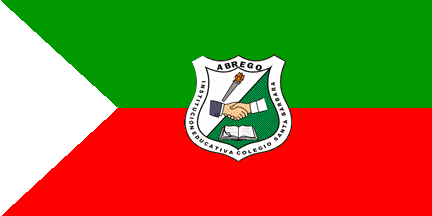 image by Ivan Sache, 14 December 2014
image by Ivan Sache, 14 December 2014
Institución Educativa Colegio Santa Barbara is located in Ábrego (Norte del
Santander Department).
The symbols of the institute were designed in 1979 under the guidance of Dubis
Isabel Ditta Altamar.
The flag is horizontally divided green-red with a white triangle placed along
the hoist. Green is a symbol of the exuberant and fertile natural environment of
the beautiful valley, and also a symbol of aspiration to a better future. Red is
a symbol of a brave nation, such as the Heborucos who once inhabited the
region. White is a symbol of peace aspired to by a village culturally marred by
violence.
The emblem is made of a Swiss-shaped shield divided white-green along the
ascending diagonal. The upper quarter is white, as a symbol of peace, charged
with a flaming torch representing sporting spirit. The lower quarter is emerald
green, representing aspiration to educate leaders for Ábrego, charged with an
open book inscribed with the institute's motto, "CIENCIA Y VIRTUD" (Science and
Virtue).
In the middle is a handshake, made of the adult hand of a teacher and of the
juvenile hand of a student, conveying a feeling of friendship and mutual aid.
Source:
http://www.colsaba.edu.co/index.php?option=com_content&view=article&id=72&Itemid=129
- Institute's website
Photos:
http://www.colsaba.edu.co/index.php?view=image&format=raw&type=orig&id=902&option=com_joomgallery&Itemid=123
http://www.colsaba.edu.co/index.php?view=image&format=raw&type=orig&id=1049&option=com_joomgallery&Itemid=123
Ivan Sache, 14 December 2014
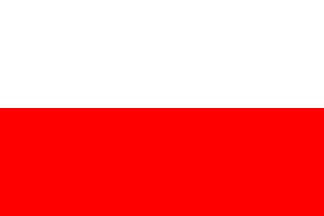 image by Ivan Sache, 18 July 2014
image by Ivan Sache, 18 July 2014
Colegio Santa Bertilla Boscardín was established in Medellín (Antioquia
Department) by the Congregation of the Teachers of Saint Dorothy, Daughters of
the Sacred Heart. The congregation was founded in 1836 in Italy by Giovanni
Antonio Farina (1803-1888; to be canonized on 23 November 2014 by Pope Francis;
Bishop of Trevise [1850] and of Vicenza [1860]) "to educate girls from poor
families" and recognized on 1 March 1839 by Pope Gregory XVI; in South America,
it has branches in Brazil, Colombia and Ecuador. The institute is named for St.
Maria Bertilla Boscardin (1888-1922; canonized on 11 May 1961 by Pope John
XXIII), who took the coat in Farina's congregation on 15 October 1905, as Sister
Maria Bertilla, and worked at the children's service of the Trevise hospital
from 1907 until her death.
The flag of the institute is horizontally
divided white-lilac pink. White is a symbol of candor and innocence of children.
Lilac pink is a symbol of the greatness and dignity of teenagers. Lilac forms a
balance between red and blue, symbolizing struggle and truce, acts and thoughts,
work and rest, scream and silence, study and recreation, emotionalism and
discernment, respectively. Lilac is also a symbol of nobleness and delicacy.
http://www.sbertilla.edu.co/images/stories/documentosPDF/simbolos.pdf -
Institute's website
Ivan Sache, 18 July 2014
 image by Ivan Sache, 14 November 2010
image by Ivan Sache, 14 November 2010
Colegio Santa Catalina de Siena, located in Maicao (Department of La
Guajira), is the main seat of Institución Educativa No. 3.
The flag of Colegio Santa Catalina de Siena, also used (by default) by
Institución Educativa No. 3, is shown on the institute's website as horizontally
divided white-red. White symbolizes peace and purity. Red symbolizes love. Peace
and love are presented as the two words that fostered St. Catherine of Siena's
life.
Source:
http://proyeccionconliderazgotic.blogspot.com/2009/03/nuestros-simbolos.html
Ivan Sache, 14 November 2010
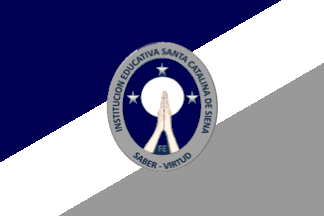 image by Ivan Sache, 3 January 2021
image by Ivan Sache, 3 January 2021
Institución Educativa Santa Catalina de Siena was established in 1993 in
Medellín in the premises of Colegio Santa María del Rosario, to be incorporated
on 2007 to INEM José Félix de Restrepo. The school was made autonomous by
Resolution No. 10,030 issued on 11 October 2013, under the erroneous name of IE
Santa Catalina de Sena, subsequently corrected.
The flag of IE Santa
Catalina de Siena is diagonally divided dark blue-white-gray from the lower
hoist to the upper fly, superimposed with the school's emblem.
Dark blue
denotes tranquility, authority, confidence and loyalty. This is the main color
transmitting power and the only one associated with stability and deepness. It
also represents knowledge, intelligence, faith and truth. Dark blue represents
knowledge, integrity, seriousness and power.
White is associated with light,
kindness, innocence, purity and virginity. It is considered as the color of
perfection, meaning security, purity and limpidity.
Gray means stability and
inspires creativity, also symbolizing success. Gray is associated with
independence, autonomy and self-control, since it is a color isolated from
external influence.
The emblem is oval, symbolizing a source of life. It
contains a border with the name of the institution. In the center are featured
hand in a praying, reflecting and contemplating attitude. The disc represents
the world, with three stars representative of the institutional values: Faith,
Knowledge and Virtue.
https://iesantacatalina.edu.co/wp-content/uploads/2017/01/MANUAL-DE-CONVIVENCIA.pdf
Manual de Conviviencia
Ivan Sache, 3 January 2021
Obverse
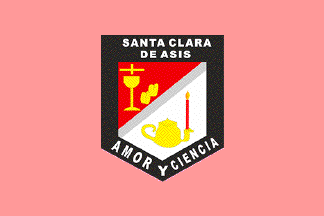 image by Ivan Sache, 30 June 2014
image by Ivan Sache, 30 June 2014
Reverse:
 image by Ivan Sache, 30 June 2014
image by Ivan Sache, 30 June 2014
Colegio Santa Clara de Asis was established on 22 January 1942 in Pasto
(Nariño Department) by Sisters Meinrada Wolf, Teolina Villegas, Ana Margarita
Osorio, Rosa Margarita Mantilla and Victoria Luisa Marín. The five nuns belong
to the congregation of the Franciscan Sisters of Mary Immaculate, founded in
March 1893 in Túquerres by Mother Caridad Bader.
The institute is named for St. Clare of Assisi (1194-1253; canonized on 26
September 1255 by Pope Alexander IV), one of the first followers of St. Francis
of Assisi (1181/2-1226; canonized on 16 July 1228 by Pope Gregory IX) and the
founder of the Order of St. Clare (Clarisses).
The flag of the institute is, on the obverse, pink with the institute's emblem
in the middle, and, on the reverse, green. Pink is a symbol of the joy of the
youth. Green is a symbol of search and aspiration to a promising future.
The emblem of the institute, adopted in 1971, was designed by Sister Damascena
Brunner. The shield is of modern Gothic shape, different from the ancient
Gothic shape by the point at the shield's bottom. The shield is divided by a
gray bend sinister, representing the girdle of St. Francis of Assisi. The dexter
field is red, a symbol of charity, love, force and blood, charged with a
chalice, a symbol of love, and with a bread and a cross, symbols of unity. The
sinister field is argent, a symbol of chastity, humility and limpidity, charged
with a lamp, a symbol of science. All the charges are yellow, except the candle
set in the lamp, which is red. The shield has a black bordure inscribed with
"SANTA CLARA DE ASIS" (top) and "AMOR Y CIENCIA" (Love and Science,
bottom) in white letters.
Source:
http://www.colegiosantaclara.edu.co/mi-colegio/simbolos.html
Ivan Sache, 30 June 2014
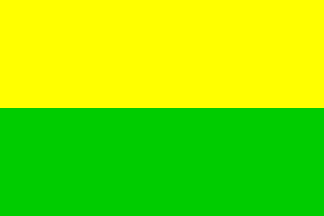 image by Ivan Sache, 03 July 2011
image by Ivan Sache, 03 July 2011
"Escuela Normal Superior Santa Clara" is located in Almaguer (Cauca
Department). The flag of the institute, as shown on the institute's blog (photo),
is horizontally divided yellow-green.
Source:
http://escuelanexa.blogspot.com/2010/06/escuela-normal-superioir-santa-clara.html
Ivan Sache, 03 July 2011